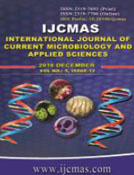


 National Academy of Agricultural Sciences (NAAS)
National Academy of Agricultural Sciences (NAAS)

|
PRINT ISSN : 2319-7692
Online ISSN : 2319-7706 Issues : 12 per year Publisher : Excellent Publishers Email : editorijcmas@gmail.com / submit@ijcmas.com Editor-in-chief: Dr.M.Prakash Index Copernicus ICV 2018: 95.39 NAAS RATING 2020: 5.38 |
Addiction on conventional plastics and their illimitable usage have resulted in waste accumulation and greenhouse gas emissions. Recent technologies are rapt headed for the development of bio-green materials in order to protect our environment. A biologically-synthesized plastic, polyhydroxyalkanoate (PHA) has been a major hope due to its similar physical properties to synthetic plastics. The selections of suitable bacterial strains, inexpensive carbon sources, efficient fermentation and recovery processes are important aspects that should be taken into consideration for the commercialization of PHA. This study is intended to utilise available agronomical by-products as carbon source to accumulate more PHA by bacterial isolate KSN5 Bacillus sp. In this present study molasses, coir pith, coconut oil cake, paddy chaff and vermicompost were used at various concentration. In present study among the different carbon sources utilized, the bacterial isolate KSN5 Bacillus sp. accumulated 95% (CDW 20.54±0.14g/L) PHA in presence of 4% molasses. Next to that, the medium supplemented with coconut oil cake was found to be a substrate for growth and PHA accumulation.
 |
 |
 |
 |
 |